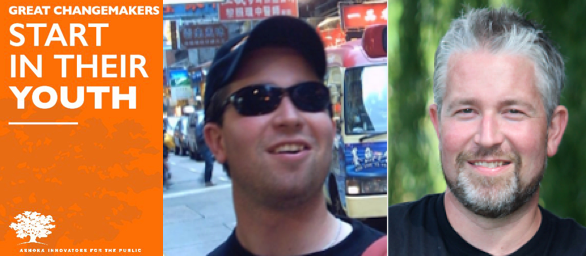An Ashoka Interview. Great Changemakers Start in Their Youth. #LeadYoung #YouthEntrepreneur
Those who started something in their teens were four times as likely to be an entrepreneur and five times as likely to be a founder.
Ashoka is the world’s leading network of social entrepreneurs, a field founded by Ashoka CEO, Bill Drayton, in 1981. Since then, Ashoka has studied the most impactful social entrepreneurs to define the best practices and patterns that allowed them to create scalable and sustainable impact. Starting something in one’s teens was found to be a key predictor for success in change-making: a critical skill in today’s world dominated by the most rapid pace of change ever seen.
This interview is one of a series highlighting the stories of CEOs, who founded a venture in their teens, and is part of Ashoka’s global movement to create ecosystems that can support young people to begin change-making in their teens.
Ashoka: Could you describe your young change-making experience?
Andy Hadfield: When I was 19 years old, I was a member of the radio station at the University of Cape Town. I did the advertising portfolio and a couple of radio shows. It was my first exposure to media… At around that time I began wondering how we could do student-type content, the same that the radio provided - but on a website. How a website could maybe replace the pin boards where posters, flyers and all other campus “news” was posted. This was pre social media, so kinda novel.
I did some brainstorming and found another website that was similar to what we were looking to do. So I partnered up with the founder and launched my first business: the Cape Town branch gAL (getALife), which was the first-ever student media platform in South Africa.
Over the next five years, we found out what other services students needed and expanded to meet those, until we had three physical bookstores, an ISP, forums, a way for students to get email addresses and even a bursary database. We had a lot of content that people were interested in, like sports and music, and our operations were mostly volunteer-run. We also had a ton of political commentary and content – quite exciting in the time of South Africa’s new democracy.
The venture scaled pretty well and was present on all major South African college campuses. Due to the shock and untimely death of the original founder, the venture hit some trouble after about 5 years. That’ll taught me to get my legal ducks in a row. As early as possible.
In the end, the business failed, but it was an amazing story and an incredible experience.
Ashoka: How do you think your story relates to the new paradigm of a world defined by change, which requires a different set of skills and experiences?
Andy Hadfield: There are two things that are critical for businesses to focus on in our new world: simplicity and scale. In terms of simplicity, there has been a fascinating shift over the past fifteen years. In 1999, websites were very complicated. More was more: you had to have as much as possible because people were more exploratory, more fascinated with this thing called a website – they’d do a lot more work to consume your content than they would now.
One of the reasons my first initiative (the student media company and content portal) possibly didn’t make as much money as it could have was that it tried to do too many things.
The norm back then was to build fairly broad, deep businesses, but that trend has completely flipped on its head as the world has changed. If you notice the kind of businesses in the technology sector today, they do one extremely simple thing, and they do it very well.
That has been a complete revelation for me throughout my career: every time I’ve tried to do something less, I’ve done it better. When you try to do something more, you lose focus and battle to get it right.
When we re-launched www.forgood.co.za (my third “start up”), we focused on proving our ability to do one simple task: to match people with a desire to help to causes that needed them. That is the only thing we’re doing, and I think this simplicity is a result of the way the world has changed, and how people interact with technology now.
That leads to the second point: scale. Throughout my career, I’ve notice the importance of scaling businesses. It has a lot to do with service-based vs. product-based models: service-based companies can scale as long as they keep hiring people, while those that are product-based can scale on much less. Thinking at scale has become very important, and we’re trying to do that at forgood. It’s great if we can match one volunteer to a cause, but what if we could match 100,000 volunteers? It’s about trying to solve real-world social problems, but using the scale that technology can bring.
Ashoka: Who supported you? Did you have a role model that inspired you in your early days?
Andy Hadfield: I didn’t really have a role model, but I wish I did! I actually fell into entrepreneurship by accident. Growing up, I always had this idea that I would be a lawyer. But when I took my first class, I realized that it wasn’t for me. LA Law looked sexier on TV that it played out in real life.
Then I sort of fell into campus radio because I enjoyed DJ-ing, and from radio I fell into running the advertising portfolio, and then got involved in the the website and from there to the idea for my first business. It just happened; there was no design. I learned how to start a business through making lots of mistakes – trial and error can be effective, if painful!
If you can get mentor, get one - they can be invaluable as a source of external guidance.
Ashoka: Do you think your early entrepreneurial experience relates to your current endeavor?
Andy Hadfield: My first venture didn’t make anyone rich, but the cool thing about starting businesses when you’re young - is that you get to learn all your lessons: it’s when you bump your head without risking the wife and kids! You’re also THINKING BIG when you’re younger, dreaming more… It’s an amazing time to try stuff. The older you get, the more risk-averse you become (at least that’s the way it worked with me).
What doesn’t change is those lessons. Every mistake I’ve ever made has been invaluable for making each new venture easier and faster. I almost wish I’d made more mistakes, quicker…
Ashoka: What advice you would give to young people who want to be entrepreneurs?
Andy Hadfield: Confidence is no replacement for experience - but they can work well together. The youth of today tend to be a little overconfident. Sometimes without the tenacity to back it up (stick-to-it-ness!).
The world won’t get delivered to you on a platter, and building businesses is not easy. Coming up with an idea is easy, but executing it is the real challenge.
If there was one piece of advice I could give to youth, it would be to keep that confidence, that self-belief, those BIG dreams, because that’s what makes this generation of youth so exciting. But channel it properly. Get grittier. Don’t job hop. Practice perseverance.
Entrepreneurship is pretty much the hardest thing you can do, it’s like getting up each morning and getting continually punched in the face. Going to sleep, waking up and having the same thing happen. Don’t believe all the overnight success you read about. In reality, it’s much harder.
Sticking with something is so important. It’s too easy in this fast-paced world to try something once, decide it won’t work, and move onto the next thing. Perseverance will be the most important skill of today’s age. Fail fast, fail often, but don’t be flaky about your projects.
Go out there and kick ass.



Comments
Post a Comment